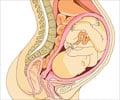Maternal position is important for the baby's health, but it was unclear as to how this can affect the wellbeing of the fetus.

- Stillbirths are a common occurrence, with around 1 in 227 births in the UK ending in stillbirth.
- Lying on the back during the third trimester //increases the risk of still birth.
- The baby's heart rate changes and the oxygen intake is reduced, posing a risk of still birth.
The researchers monitored the fetal and maternal heart rate for 29 healthy pregnant women in the third trimester while changing and maintaining maternal positions for 30 minutes at a time. The 'fetal behavioural state', a measure of fetal health, was recorded for each maternal position. Each woman was followed until delivery and all babies were born in a healthy condition.
Peter Stone, Professor of Maternal Fetal medicine at the University of Auckland and lead investigator of the study explained, "Our controlled study found that lying on your back can add extra stress to the baby, contributing to the risk of stillbirth. The risk is likely to be increased further in women with underlying conditions."
Source-Medindia















